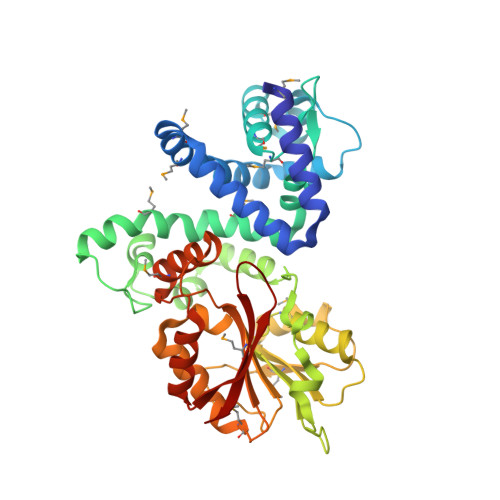Crystal structure of the multifunctional SAM-dependent enzyme LepI provides insights into its catalytic mechanism.
Chang, M., Zhou, Y., Wang, H., Liu, Z., Zhang, Y., Feng, Y.(2019) Biochem Biophys Res Commun 515: 255-260
- PubMed: 31101338
- DOI: https://doi.org/10.1016/j.bbrc.2019.05.031
- Primary Citation of Related Structures:
6INW - PubMed Abstract:
Pericyclic reactions are among the most powerful synthetic transformations widely applied in the synthesis of multiple regioselective and stereoselective carbon-carbon bonds. LepI is a recently identified S-adenosyl-l-methionine (SAM)-dependent enzyme, which could catalyze dehydration, Diels-Alder reaction, and the retro-Claisen rearrangement reactions. However, the mechanism underlying these reactions by LepI remains elusive. Here we report the structure of LepI in complex with SAM as its co-factor, which adopts a typical class I methyltransferase fold. Docking studies are performed to investigate the binding modes of various substrates/products and provide insights into the catalytic mechanism of the multiple reactions catalyzed by LepI. Our study suggests that the dehydration reaction may start from the deprotonation of the hydroxyl group on the pyridone ring of the substrate by LepI H133 , during which R295 and D296 play important roles in substrate binding and stabilizing the reaction intermediate. The stereoselective dehydration is accomplished through the trans-conformer of the leaving alcohol group which is trapped by nearby residues. The pericyclic reactions following dehydration are facilitated by the hydrophobic and hydrophilic interactions in the binding pocket. H133 and R295, two residues not conserved in other methyltransferases, might account for the unique activity of LepI among the SAM-dependent methyltransferase family. Together, this study provides important structural insights into the unique reactions catalyzed by LepI and will shed light on the knowledge of mechanisms of pericyclic reactions.
Organizational Affiliation:
Beijing Key Lab of Bioprocess, Beijing University of Chemical Technology, Beijing, 100029, PR China.
















